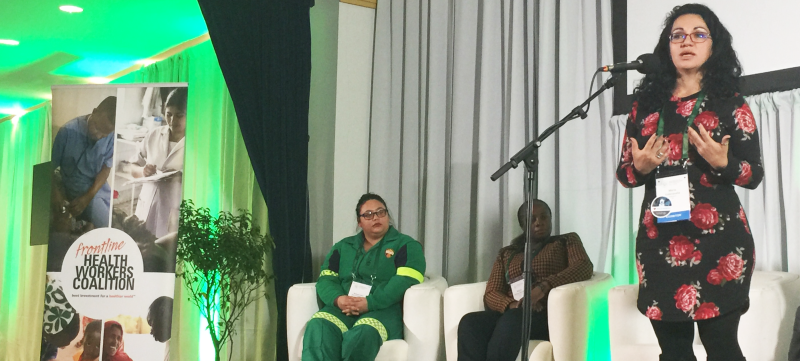Where We Work
See our interactive map


Maria Valenzuela, a community health worker for Esperança in Phoenix, Arizona, speaks at the “Lives in Their Hands” storytelling night Nov. 13, 2017, co-sponsored by the Frontline Health Workers Coalition, Global Health Workforce Network, Women in Global Health, and the World Health Organization. Photo courtesy Frontline Health Workers Coalition and IntraHealth International.
What will it take to offer true patient-centered care?
As 2018 begins with the clock already ticking on the 2030 Sustainable Development Goal (SDG) targets, the heroic, sometimes harrowing, and heartwarming stories of six frontline health workers from four continents delivered on a crisp November evening in Dublin reflect both the promise and the tangled reality of the policy planning and program implementation needed to fulfill the promise of unprecedented global consensus on health and development.
What I hope stuck in the minds of thousands of the top global health experts that had gathered in Dublin for the Fourth Global Forum on Human Resources for Health was not the geographic diversity of these health workers’ stories, but rather their diversity of skills.
Intuitive though it may seem, ensuring access to a proper skill mix—represented in part by Mexican- American community health worker Maria Valenzuela, Liberian nurse Miatta Gbanya, Zambian nurse-midwife Marjorie Makukula, South African paramedic Rushaana Gallow, Burmese community doctor Hay Mar Khine, and Irish cardiac physiologist Paul Nolan at the “Lives in Their Hands” storytelling night in Dublin—is a complex yet fundamental equation for global health policy leaders to solve in 2018 and beyond.
How well this question—posed at a side session in Dublin led by Medtronic Foundation and IntraHealth International—is answered and acted upon will determine the success of SDG3 to “ensure healthy lives and promote well-being for all at all ages” and the success of all disease- and health issue-specific compacts and targets under SDG3’s umbrella.
As borne out in several sessions in Dublin, community health workers (CHWs) are a key part of the answer, as they are already helping to deliver tremendous progress in dozens of countries around the world.
At the Medtronic Foundation and IntraHealth session, Hafeez Ladha of the Financing Alliance for Health detailed a new analysis finding that in sub-Saharan Africa, about $1.1 billion is spent annually on community health programs. This spending has helped lead to major improvements on health indicators from HIV/AIDS to maternal and child survival in countries like Ethiopia.
And, as Mallika Raghavan of Last Mile Health presented at the same session, CHWs are a central pillar of Liberia and other countries’ plans to ensure their entire populations receive patient-centered care and are protected from threats like Ebola in the years to come.
However, CHWs’ potential is still largely underreported, untapped, disaggregated, and severely underfinanced.
The Financing Alliance for Health estimates about $3.1 billion is needed annually to implement sustainable community health programs in sub-Saharan Africa, about $2 billion less than what is being spent now. New efforts—such as USAID and UNICEF’s partnership on community health program integration in 7 low- and middle-income countries and the Bill & Melinda Gates Foundation’s work to improve primary health care (PHC) performance—are aiming to address this gap.
For a surge in community and primary health programs to be effective, we must learn from the past.
As pointed out by IntraHealth’s Laura Hoemeke during the Medtronic Foundation-IntraHealth session in Dublin, CHW and PHC programs of all shapes and methods have been tried since the Alma Ata Declaration of universal primary health care in 1978 to widely different outcomes.
Critical components of success—as noted in the first-ever Global Strategy on Human Resources for Health: Workforce 2030—is a “collaborative primary care approach built on team-based care” that reflects “a more diverse skills mix...to harness the potential contribution of all health workers for a more responsive and cost-effective composition of health-care teams.”
Less than 40% of current spending in sub-Saharan Africa is supporting integrated CHW programs, according to the Financing Alliance for Health—underscoring a need for disease-specific programs to more effectively integrate their health workforce strengthening efforts, as well as a need to better integrate CHW programs into national HRH plans.
The Frontline Health Workers Coalition in 2013 worked with several donor agencies and partners on a CHW Harmonization Framework to improve integration of CHW programs—an essential ongoing effort our members continue, that must be firmly embedded in the World Health Organization’s (WHO) first-ever guidelines on CHW programs, expected to be finalized in 2018.
As recent reports like Midwives Realities, Midwives Voices and labor disputes such as the doctors’ strike in Kenya remind us, ensuring a resilient health workforce able to deliver universal health coverage and meet global health targets requires that we listen and meaningfully include frontline health workers of every cadre in the policy-making and advocacy process.
By doing so, we can chip away at any misperceptions and apprehensions between cadres and health workforce delivery models to better answer and act on the question of how to implement truly patient-centered care.
And as new and better health workforce data starts to be collected via the National Health Workforce Accounts, the WHO-ILO-OECD Working for Health data collaborative, and other sources, we as advocates in 2018 and beyond must do all we can to ensure the interest, momentum, and enthusiasm to improve access to primary, essential services is harnessed to country-led, sustainably financed approaches that deliver a team of connected frontline health workers with the passion and skills shown on that stage in Dublin to enable their communities to thrive.
This post originally appeared on the Frontline Health Workers Coalition blog.
Get the latest updates from the blog and eNews




